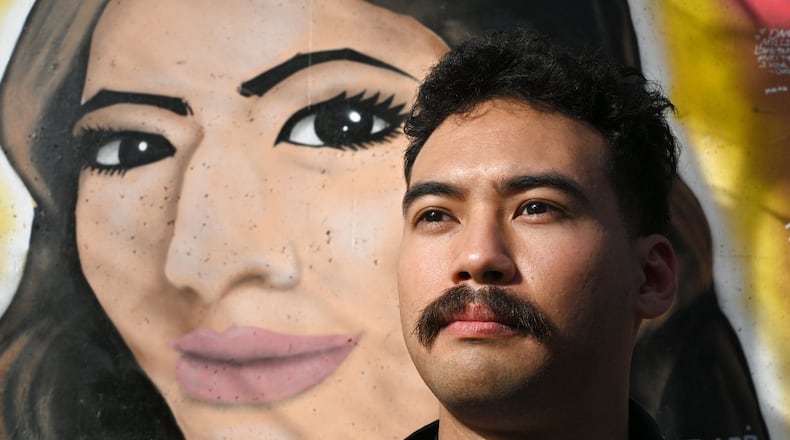Georgia is imposing greater supervision and restrictions on sex offenders, driven by organizers who want to see stronger legislation to prevent violent crimes.
The Georgia Dangerous Sexual Predator Act, which takes effect Saturday, requires newly released offenders to wear ankle monitors that can be tracked by GPS while officials review their risk for committing new crimes. The law also mandates minimum sentences for repeat offenders.
Known as “Mariam’s Law,” the measure was enacted this year in response to the 2021 abduction and killing of Mariam Abdulrab, a 27-year-old Atlanta bartender. Her accused killer, Demarcus Brinkley, had served seven years in prison for committing sex crimes against two young girls and was placed on the Georgia sex offender registry upon his release. He faces a slew of charges including murder, kidnapping and attempted rape. He is being held at the Fulton County Jail.
“They never really reviewed Demarcus Brinkley,” said Ali Abdulrab, Mariam’s younger brother. “He never got a classification.”
Mariam Abdulrab was on her way home from work early Aug. 13, 2021, when she was forced into a blue Chevrolet Equinox at gunpoint outside her boyfriend’s house in southeast Atlanta. Hours later, her body was found outside a vacant home. She had been shot multiple times.
The police arrested Brinkley, then 27, later the same day.
When Abdulrab’s family learned of Brinkley’s past, they began raising questions about the Sexual Offender Risk Review Board, a state agency that classifies sexual offenders based on their likelihood of committing new crimes. Because of a backlog of cases, Brinkley had never been assessed, leaving the community unaware of the danger he may pose and his chances of re-offending upon his release.
Funding and personnel issues have plagued the board since it was created in 2006, Tracy Alvord, the agency’s executive director, said in an interview.
“We’re a very small agency, and over the years, for the most part, have not received much recognition for the need for additional staff and funding,” Alvord said.
The agency is responsible not only for the more than 37,500 offenders on the registry, it must also classify hundreds of offenders each month: newly released parolees, new offenders who have been sentenced, and out of state offenders who move to Georgia and ask to be removed from the registry.
Alvord wants to update the board’s classification system to give the public more specific information about an offender’s potential threat. She also wants to prioritize agency resources to the most dangerous offenders as opposed to out of state offenders who move to Georgia just to be taken off of the public registry.
“The public registry really needs to be about who are the really dangerous people,” she said. “Let’s use our resources for the people who really need to be monitored strongly.”
Peter Skandalakis, director of the Prosecuting Attorneys Council of Georgia, said the agency has done a “tremendously good job given their resources.”
“They need assistance. The numbers speak for themselves,” Skandalakis said. “This is a labor intensive effort and you’ve got to have people in place to do the job.”
The changes mandated by Mariam’s Law would not have happened without the efforts of Abdulrab’s family and friends, said state Rep. Steven Sainz (R-St. Marys), who sponsored the measure.
“It’s a testament not just to how significant the tragedy was, but how their family and friends really coalesced to create this grassroots support for real change in the state,” Sainz said. “So they definitely took what is a huge tragedy with Mariam’s life being lost unnecessarily early and turned it into something extraordinarily positive for Georgians in the future.”
In homage to his sister and to advocate for additional legislative changes to prevent violent crimes, Ali Abdulrab created “Mariam Forever”, an Instagram page boasts that almost 3,500 followers. It features pictures not only of Mariam’s life, but of a mural painted in her honor. The mural, located near the Krog Street Tunnel in Atlanta, is decorated with messages honoring Mariam’s memory and the many lives that she touched.
Honoring Mariam by pushing for change came almost automatically, Ali Abdulrab said.
“We were just, without thinking, just moving,” he said. “And like, I don’t know, it felt like my sister, who she was, was pushing everyone to do this. Not just for her, but for the greater good of everyone else.”
About the Author
Keep Reading
The Latest
Featured


